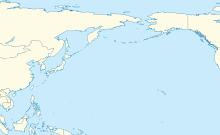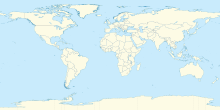Jeju International Airport
Jeju International Airport 제주국제공항 | |||||||||||||||
|---|---|---|---|---|---|---|---|---|---|---|---|---|---|---|---|
 | |||||||||||||||
| Summary | |||||||||||||||
| Airport type | Public | ||||||||||||||
| Owner | Ministry of Land, Infrastructure and Transport | ||||||||||||||
| Operator | Korea Airports Corporation | ||||||||||||||
| Serves | Jeju Island | ||||||||||||||
| Location | Jeju City, Jeju Province, South Korea | ||||||||||||||
| Opened | 26 April 1968 | ||||||||||||||
| Hub for | Jeju Air | ||||||||||||||
| Focus city for | |||||||||||||||
| Operating base for | |||||||||||||||
| Elevation AMSL | 36 m / 118 ft | ||||||||||||||
| Coordinates | 33°30′41″N 126°29′35″E / 33.51139°N 126.49306°E | ||||||||||||||
| Website | www | ||||||||||||||
| Map | |||||||||||||||
 | |||||||||||||||
| Runways | |||||||||||||||
| |||||||||||||||
| Statistics (2019) | |||||||||||||||
| |||||||||||||||
| Jeju International Airport | |
| Hangul | 제주국제공항 |
|---|---|
| Hanja | 濟州國際空港 |
| Revised Romanization | Jeju Gukje Gonghang |
| McCune–Reischauer | Cheju Kukche Konghang |
Jeju International Airport (IATA: CJU, ICAO: RKPC) is the second-largest airport in South Korea, just behind Incheon Airport in Incheon (near Seoul). It is located in the city of Jeju. The airport opened in 1968.
Jeju International Airport serves many mainland destinations in South Korea, as well as international destinations in mainland China, Hong Kong, Japan, Taiwan, Thailand, Malaysia and Singapore. In 2015, 26,237,562 passengers used the airport. The airport is one endpoint of the world's busiest airline route, Jeju to/from Seoul-Gimpo. In 2023 over 13.7 million passengers traveled on that route.
Due to the airport operating far beyond its designed passenger capacity, it was announced in 2023 that Jeju's second airport would be constructed in Seongsan-eup, near the southern city of Seogwipo. This US$5.1 billion project has faced significant delays and controversies due to concerns the airport would negatively impact Jeju's groundwater sources, as well as protected species living in the area.[3]
Airlines and destinations
[edit]Traffic and statistics
[edit]Due to the popularity of Jeju as a holiday spot in South Korea, the air route from Jeju to Seoul is the busiest airline route in the world.[37] In 2019, there were 85,000 flights from eight different airlines, meanwhile, 17 million seats were sold on flights between Gimpo and Jeju.[citation needed]
As Jeju has gained popularity as a resort destination, the number of international visitors from China, Malaysia, Thailand, and Japan has increased. In 1997, Jeju airport handled nine million passengers. In 2019, the airport passed the 30 million milestone despite being designed to handle a maximum of 26 million passengers.[citation needed] In 2020, the number of international visitors dropped due to COVID-19. However, the Seoul-Jeju route remained the busiest in the world and flight delays are still common.[38]
In 2019, the Ministry of Land, Infrastructure, and Transport announced a US$4.18 billion construction plan that would begin in 2021 near Seogwipo City in southern Jeju. The airport would take 50% of the domestic flights to Jeju and would help to transfer flights during bad weather. The airport would accommodate 18.98 million passengers per year.[38] However, in 2021 the Ministry of Environment cancelled the plans due to their failure to protect the local environment, including Jeju's extensive groundwater reserves, and protected species in the area, such as the narrow-mouthed frog. A new US$5.1 billion airport plan was provisionally approved in 2023 with no project completion date set.[3]
Traffic by calendar year
[edit]Graphs are unavailable due to technical issues. There is more info on Phabricator and on MediaWiki.org. |
| Passenger volume | Change over previous year | Aircraft operations | Cargo tonnage | |
|---|---|---|---|---|
| 1997 | 9,819,129 | 63,134 | 287,204 | |
| 1998 | 7,469,980 | 50,979 | 275,899 | |
| 1999 | 8,242,134 | 49,978 | 290,168 | |
| 2000 | 9,125,939 | 55,675 | 320,633 | |
| 2001 | 9,320,337 | 60,597 | 329,895 | |
| 2002 | 9,939,700 | 68,681 | 337,750 | |
| 2003 | 10,802,989 | 77,069 | 339,498 | |
| 2004 | 11,104,341 | 76,075 | 327,325 | |
| 2005 | 11,354,925 | 73,556 | 317,839 | |
| 2006 | 12,109,836 | 78,611 | 315,129 | |
| 2007 | 12,296,426 | 93,073 | 288,453 | |
| 2008 | 12,448,084 | 95,671 | 225,479 | |
| 2009 | 13,643,366 | 99,323 | 240,253 | |
| 2010 | 15,724,360 | 103,426 | 231,287 | |
| 2011 | 17,201,878 | 112,696 | 251,975 | |
| 2012 | 18,443,047 | 120,699 | 244,647 | |
| 2013 | 20,055,238 | 130,454 | 237,328 | |
| 2014 | 23,197,796 | 145,533 | 275,429 | |
| 2015 | 26,237,562 | 158,691 | 278,718 | |
| 2016 | 29,707,364 | 172,742 | 291,494 | |
| 2017 | 29,604,363 | 167,280 | 275,129 | |
| 2018 | 29,455,305 | 168,331 | 266,370 | |
| 2019 | 31,316,394 | 175,366 | 258,847 | |
| 2020 | 21,054,696 | 138,256 | 171,385 | |
| 2021 | 25,802,550 | 160,230 | 188,926 | |
| 2022 | 29,703,662 | 169,624 | 210,962 | |
| 2023 | 29,096,271 | 167,086 | 202,609 | |
| Source: Korea Airports Corporation Traffic Statistics[2] | ||||
Domestic traffic by route
[edit]| Rank | Airport | Passengers | Aircraft movements |
Carriers |
|---|---|---|---|---|
| 1 | Seoul-Gimpo | 17,250,478 | 95,042 | Air Busan, Air Seoul, Asiana Airlines, Jeju Air, Jin Air, Korean Air, T'way Air |
| 2 | Busan | 3,714,710 | 21,498 | Air Busan, Air Seoul, Jeju Air, Jin Air, Korean Air |
| 3 | Cheongju | 3,172,099 | 18,494 | Aero K, Asiana Airlines, Jeju Air, Jin Air, Korean Air, T'way Air |
| 4 | Daegu | 2,144,594 | 12,587 | Asiana Airlines, Jeju Air, Jin Air, T'way Air |
| 5 | Gwangju | 1,661,178 | 9,907 | Asiana Airlines, Jeju Air, Jin Air, Korean Air, T'way Air |
Busiest international routes
[edit]| Rank | Airport | Passengers | Aircraft movements |
Carriers |
|---|---|---|---|---|
| 1 | Singapore | 37,282 | 208 | Scoot |
| 2 | Bangkok–Suvarnabhumi | 26,518 | 185 | Jeju Air |
| 3 | Osaka–Kansai | 13,678 | 104 | T'way Air |
| 4 | Taipei–Taoyuan | 4,724 | 38 | Tigerair Taiwan, T'way Air |
| 5 | Xi'an | 4,007 | 50 | Jin Air |
Accidents and incidents
[edit]- 5 February 1982: A Republic of Korea Air Force Fairchild C-123 Provider crashed 2.3 miles N of Hallasan Volcano while on approach to land at Jeju in bad weather. All 53 occupants (six crew, 47 army troops) were killed.[39]
- 10 August 1994: Korean Air Flight 2033, an Airbus A300-600R (registered as HL7296) overran the runway while attempting to land at Jeju International Airport. The plane was arriving from Seoul. All 160 persons on board survived.[40]
- 28 July 2011: Asiana Airlines Flight 991, a Boeing 747-400F (registered as HL7604) experienced an in-flight fire and crashed while attempting to divert to Jeju. The plane was enroute from Incheon to Shanghai. Both pilots were killed.[41]
See also
[edit]- Alddreu Airfield
- List of the busiest airports in South Korea
- List of airports in South Korea
- List of airports by ICAO code – South Korea
- Transport in South Korea
References
[edit]- ^ "Airport information for RKPC". World Aero Data. Archived from the original on 5 March 2019.
{{cite web}}: CS1 maint: unfit URL (link) Data current as of October 2006. - ^ a b c d "KAC 한국공항공사".
- ^ a b "Second Jeju Island airport approved after earlier rejection". koreajoongangdaily.joins.com. 6 March 2023. Retrieved 29 May 2024.
- ^ "Aero K hebt verspätet ab". aeroTELEGRAPH (in Swiss High German). 29 March 2021. Retrieved 31 May 2022.
- ^ "에어서울, 일본발 악재에 '국내선' 유턴" (in Korean). 30 August 2019.
- ^ "Beijing Capital Resumes Hangzhou – Jeju Service From Dec 2023". Aeroroutes. Retrieved 17 November 2023.
- ^ a b "Mainland Chinese Carriers NS23 International / Regional Network – 23APR23". Aeroroutes. Retrieved 24 April 2023.
- ^ "CHINA UNITED ADDS INTERNATIONAL SERVICE FROM ORDOS IN LATE-2Q24". Aeroroutes. Retrieved 28 May 2024.[permanent dead link]
- ^ "Donghai Airlines Resumes Nantong – Jeju in Sep 2024". Aeroroutes. Retrieved 5 August 2024.
- ^ "이스타항공, 8월부터 청주-제주 노선 운항 재개" [Eastar Jet, resumes Cheongju-Jeju route in August] (in Korean). NBN. 15 June 2023.
- ^ "이스타항공, 내달 군산∼제주 노선 신규 취항" [Eastar Jet, launches Gunsan~Jeju route in next month] (in Korean). Yonhap News Agency. 6 September 2023.
- ^ "Eastar to resume flights this month for turnaround". Yonhap News Agency. 14 March 2023.
- ^ "HK Express 1Q23 Korea Service Restorations". Aeroroutes. 15 November 2022.
- ^ a b "Jeju Air Expands Mainland China Network From late-April 2024". Aeroroutes. Retrieved 12 April 2024.
- ^ Jeju Air adds Jeju – Hong Kong route in 3Q18 Routesonline. 31 May 2018.
- ^ "JiangXi Air plans Jeju service from late-April 2024". Aeroroutes. Retrieved 21 March 2024.
- ^ Liu, Jim. "Jin Air adds new domestic routes in 2Q20". Routesonline. Retrieved 26 May 2020.
- ^ "진에어·제주항공, 제주 노선 신규 취항…매일 2회 운항" (in Korean). Yonhap News Agency. 29 September 2020.
- ^ a b "Jin Air Expands Jeju Domestic Network in NS24". Aeroroutes. Retrieved 28 March 2024.
- ^ "포항~김포, 포항~제주 노선 진에어 31일 취항" (in Korean). Yonhap News Agency. 16 July 2020.
- ^ "진에어, 원주~제주 노선 다음 달 8일 신규 취항" (in Korean). Korean Broadcasting System. 25 September 2020.
- ^ "Juneyao Airlines Resumes Jeju Service in NS23". Aeroroutes. Retrieved 10 March 2023.
- ^ ""국내선 지방/제주 운항 재개"". Koreanair. Retrieved 6 October 2023.
- ^ "사천-제주 하늘길 3년 5개월 만에 다시 뚫렸다…신규 노선 취항" [Sacheon-Jeju route reopens in 3 years and 5 months] (in Korean). Yonhap News Agency. 13 October 2023.
- ^ "Korean Air resumes Jeju – Tokyo service from July 2024". Aeroroutes. Retrieved 14 May 2024.
- ^ "대한항공 여수~제주 노선 29일부터 재개…여수공항 12→14편" [Korean Air resuming Yeosu~Jeju from 29th] (in Korean). News1. 4 October 2023.
- ^ "Loong Air resumes Jeju service from late-June 2023". Aeroroutes. Retrieved 29 May 2023.
- ^ "Loong Air adds Jeju – Ningbo in 3Q24". Aeroroutes. Retrieved 20 June 2024.
- ^ Liu, Jim (20 June 2024). "RUILI AIRLINES ADDS WUXI – JEJU FROM MID-JUNE 2024". Aeroroutes. Retrieved 20 June 2024.
- ^ "开航|8月21日起,春秋航空将复航广州=济州岛航线,每天1班". Retrieved 24 July 2024.
- ^ "Spring Airlines adds Nanjing – Jeju service from mid-August 2019". routesonline. Retrieved 24 July 2019.
- ^ "9月1日起 天津航空新开榆林=济州岛国际航线 每周2班". Retrieved 3 September 2024.
- ^ "tigerair Taiwan NW22 Operation Changes – 13OCT22". Aeroroutes. Retrieved 27 October 2022.
- ^ T'Way Air NW22 Japan Operations – 27OCT22 Aeroroutes. 27 October 2022.
- ^ "T'Way Air adds Jeju – Taipei service in late-Dec 2022". Aeroroutes. Retrieved 8 November 2022.
- ^ "XiamenAir adds Fuzhou – Jeju service From late-Jan 2024". Aeroroutes. Retrieved 4 January 2024.
- ^ Worldwide, OAG Aviation. "Busiest Routes Right Now". www.oag.com. Retrieved 3 June 2021.
- ^ a b "New Jeju Airport still facing challenges". The Korea Times. 21 June 2019. Retrieved 3 June 2021.
- ^ Accident description for unknown at the Aviation Safety Network. Retrieved on October 18, 2023.
- ^ Ranter, Harro. "ASN Aircraft accident Airbus A300B4-622R HL7296 Cheju Airport (CJU)". aviation-safety.net. Retrieved 15 July 2018.
- ^ "Official: Pilot on crashed South Korean cargo plane reported fire in final moments | Macleans.ca - Canada - Features". 25 January 2014. Archived from the original on 25 January 2014.




